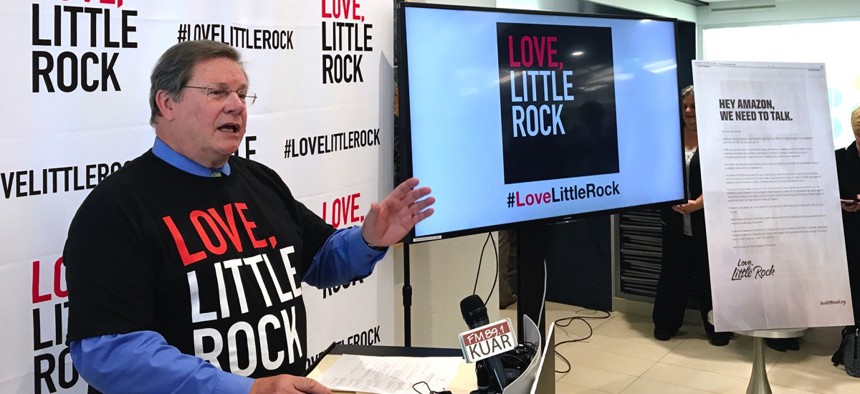Cities Need Equitable Workforce Pipelines

Little Rock, Arkansas Mayor Mark Stodola, who is also president of the National League of Cities, discusses his city's decision to not pursue Amazon's proposed second headquarters at a news conference on Oct. 19. Andrew DeMillo / AP Photo
The National League of Cities has been working with six in particular to improve access to skills training and postsecondary education like their economies depend on it—because they do.
WASHINGTON — Mayors must establish equitable pipelines for the skilled labor essential to cities’ economic development, according to new National League of Cities findings shared Monday in D.C.
For the past two years, the NLC Institute for Youth, Education and Families helped six cities—Austin, Texas; Charleston, South Carolina; Corpus Christi, Texas; Houston; Jacksonville, Florida; and Nashville, Tennessee—develop strategic plans to increase access to workforce training programs and postsecondary education.
Austin’s workforce development plan aims to get 30,000 people middle-skilled jobs by the end of 2021.
“Every job that’s created, if we continue to have to import that skill and train labor, that’s another person exacerbating our housing affordability crisis,” said John-Michael Cortez, Austin special assistant to the mayor, during the NLC national briefing. “That’s yet another car on our woefully underfunded transportation infrastructure.”
The plan unites the Austin Chamber of Commerce with local school districts and major employers addressing, in particular, institutional racism among low-income families of color in communities along the city’s “eastern crescent.”
Equity is the focus of every policy decision Austin makes, Cortez said, overshadowing even the possibility of Amazon HQ2 coming to the metro unless systemic inequities are addressed as part of a deal.
“As a mayor, I can tell you that’s the great challenge is to make sure that we come up with an opportunity to reach out to those people of low-income or ethnic or racial backgrounds and otherwise disadvantaged populations to figure out how to help them benefit from the economic growth and development that we see in our communities,” said Little Rock, Arkansas Mayor Mark Stodola, who is also president of NLC.
Mayors’ primary goal must be ensuring all high school students graduate with workforce training or headed on to postsecondary school, Stodola said. Cross-sector partnerships that bring city halls together with local businesses, school districts and community colleges are central to that endeavor.
Skills training, a two-year community college degree of a four-year college degree are “the only way for our nation to stay competitive,” said former second lady Jill Biden, who began championing affordable community college options during the Obama administration.
“Education isn’t a one-way street,” Biden said. “It’s a conversation between us and the next generation.”
Working with NLC, Corpus Christi had a strategic plan in place by October 2017 calling for 60 percent of its population to have a postsecondary degree by 2030.
Houston created Hire Houston Youth to close its equity gap, especially in segregated neighborhoods. The program provides free, soft-skill development training ahead of participating youth landing jobs required to pay $8 at minimum.
Through surveys, the city has gathered feedback from school districts and local partners on the biggest barriers to accessing workforce training programs and postsecondary education like insufficient transportation and food insecurity.
“Making sure that you always have the community’s voice involved in the development of your policy and program is absolutely critical,” said Juliet Stipeche, Houston director of education. “That will keep equity as a focus because our communities are so diverse and yet, many times, they’re still extraordinarily similar.”
Dave Nyczepir is a News Editor at Government Executive’s Route Fifty and is based in Washington, D.C.
NEXT STORY: Chinese Tariffs Will Hit California's Most Vulnerable Counties Hardest






